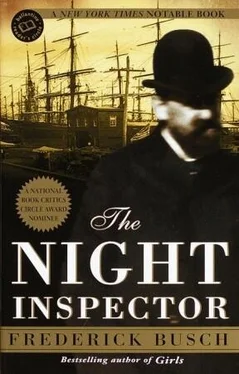“Father Jesus!” he cried. “I’ll stop. I’ll never drink again. Don’t take me off!”
“This is the last chance I’ll give,” I intoned.
“Never a drop by the Mother of God!”
“Go home,” I told him.
He rolled onto his hands and his knees, then edged sideways to the stanchion of the lamp and pulled himself to his feet. I pointed east, and he went that way, tripping and sliding, although of course I had no idea where he might live. A fast cabriolet, its window blinds pulled down, almost struck him, and it seemed to me that two squat, bearded sailors, nearly as drunk as he, were altering their course to follow in his steps; he was hardly out of danger, I thought.
A family from India, it seemed — the father wore a dirty turban, his wife a sari of bright, stained yellow — were moving their household at dawn, along the railroad embankment at Hamilton Square at the corner of East Sixty-fifth. She carried a sleeping infant, swathed in blue, in her slender, hairy left arm; in her right, she steadied on her shoulder a long, thick wooden rod that rested, before her, on the shoulder of her man. To it were fastened deep baskets containing clothing, perhaps foodstuffs, implements, little wooden boxes round and square, and several sets of garments, some slippers and shoes. The father carried a sleeping child of two or so upon his other shoulder. They marched a peculiar dancing march to the rhythm established by the swinging weight of their household goods. They walked, in alternating darkness and light, communicating, so it seemed, through the distribution and redistribution of their burden. He, as he passed me, smiled; she, drawn and woeful, affected not to see me, although I watched her eyes widen as her view of me improved.
At the time of which I speak, you could enter Harry Hill’s dance hall, on Houston Street, for twenty-five cents. Men and women alike were welcomed, but they had to pay, receive a little dish of oysters, and move upstairs toward the music. The wooden floorboards cracked and groaned beneath the dancers’ weight, and everyone danced. Men in white-and-blue-striped sailor’s jerseys circulated among the guests and they quickly compelled those not dancing, for more than one song’s duration, to leave. It was all very respectable, and although I did not any longer dance, and of course I did not parade my visage in the hope of making female friends, it had never occurred to me that Hill’s was anything but respectable. On behalf of workingmen and — women, I had always been appreciative. It took Jessie, of course, with her restrained and largely uninflected voice to tell me that on the floor above the music, a partial third floor — it did not run the breadth of the building — there were clean, inelegant private rooms where dancers might, for more than twenty-five cents, lock the door and make love — make, that is, whatever they were driven to.
“You have done this?” I remember asking her, one night in her room.
She said, into the flesh of my unmasked face, “I have done everything, Billy.”
So, it seemed, had Lizzie and her girls, and possibly the silent, wracked Stanwix, waiting all the day, cajoling the silent son and brother, contemplating their wakefulness while Malcolm engaged in a sleep as alien to them, perhaps, as the winking sleep of dogs, the wintry sleep of bears. So, of course, had M. For so many of his young years, he had written what he could to make his way and make his wage; then, apparently, he had manufactured what he must, and he’d made neither. That is the way of the world, the ebb and flow of dollars, but knowing this could not have been of consolation; and in the pressure in the house — an atmosphere, like storm, as the barometric pressure dropped, and the very air pressed hard, in silence, at the inner doors of the rooms, the windows looking onto East Twenty-sixth Street — he drank his drinks and then escaped to walk to work, swallowing his own saliva as it welled like poison in his throat and mouth, and heard, from this remaining friend or that, how many of the other, former, friends were certain he had died.
So he had died. And yet he walked upon the cold or steamy streets. He smoked his pipe. Lizzie’s life went on, and the children strove to live in theirs, and he received his pay and bought his books and drank his drinks. He had imagined his way to, or had projected upon the page from within, a man so enormous in his woundedness and hate and maleficence — a man with tenderness, too, and a lover’s eye for the shape, say, of the hunted whale’s small ear — that he would risk a story about a man awaking in an inn with the leg of a stranger thrown, like a wife’s, over his own. He would confess, that is to say, the hugeness of his own appetite in the body of a storytelling sailor. He would consider it a little moment in a momentousness: the story of a man who stabbed at all of the world, as if it were a mask, to reach through to — God, I suppose. Or the Satan we see as God. Or some absolutely other and dark indifference.
From tasking and tallying the whale, from daring the world with his story, he had gone to philosophical growls and speculations, and from there to saying less and less, and to counting the boxes and barrels on board merchant seamen lying- to in the Port of New York. From giving forth, he had declined to acting on behalf of those who received. If Lizzie had reported ball lightning on the chandeliers and banisters, a product of electric tension, I would not have been surprised. He had gone from life to a death-in-life, and was required — as husband, as father, as laborer for the Customs Collector of New York — to pretend that his failing stumble was a healthy trot. It was required that he not merely weep, or fall upon his sword, or, like his son, become his own assassin.
It was required — by my life, by Jessie’s needs — that his unfortunate decline be as a resource to me; I must employ him, as the builder used lumber, as the chemist used salts, as the blacksmith used iron in his fire. As, it occurred to me, Sam Mordecai, his pencil in hand, his notebook open, used the sights I showed him and, it also occurred to me, might go so far as to use the driven man in his open-mouthed mask.
The heat in the city, and surely in the airless Points, had grown yeasty and wet. Folded papers expanded with moisture, cloth felt saturated, and the dirty walls and cobbles looked shiny, as if with the trails of slugs I used to see on the leaves of plants in my mother’s garden and along the fieldstone walls I had maintained. I carried my coat beneath my arm when I walked at night or went to the office at midday or later. Under the mask, I perspired uncomfortably, and was disgusted by what I thought was the odor of my own torn flesh. But I did go to the office, where I prepared papers to accompany those documents under preparation by Lapham Dumont and from which I issued orders to buy winter wheat upon speculation, or to invest in certain developments — railroads, absolutely, and the larger hotels in cities (now towns) destined for rail-heads — and I conducted intelligent business. I brought in crushed tomatoes in great vats for the growing appetite of the city (they were easier to ship if crushed, and in sauces and soups were not needed whole). I brought in citrus fruits from south and west (sustaining a loss in the shipment from California that came around by boat, breaking even on the southwestern shipments that were carted to the railroad at Chicago). I imported olives from Greece because the shipper sent them in stained terra-cotta amphorae, which — once the olives, transferred to barrels, were sold to wholesalers — I then sold, through professional consultants, as antiquarian relics to a surprising number of the rising upper-middle class in manufacturing and retail sales who required something noticeably new in their little palaces along Fifth Avenue.
Читать дальше












